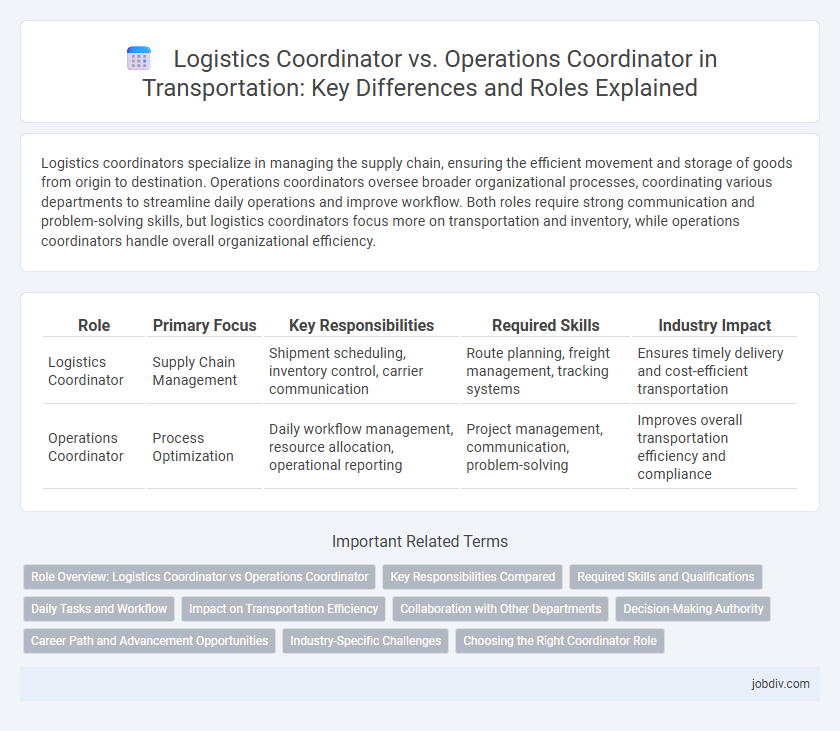Logistics coordinators specialize in managing the supply chain, ensuring the efficient movement and storage of goods from origin to destination. Operations coordinators oversee broader organizational processes, coordinating various departments to streamline daily operations and improve workflow. Both roles require strong communication and problem-solving skills, but logistics coordinators focus more on transportation and inventory, while operations coordinators handle overall organizational efficiency.
Table of Comparison
| Role | Primary Focus | Key Responsibilities | Required Skills | Industry Impact |
|---|---|---|---|---|
| Logistics Coordinator | Supply Chain Management | Shipment scheduling, inventory control, carrier communication | Route planning, freight management, tracking systems | Ensures timely delivery and cost-efficient transportation |
| Operations Coordinator | Process Optimization | Daily workflow management, resource allocation, operational reporting | Project management, communication, problem-solving | Improves overall transportation efficiency and compliance |
Role Overview: Logistics Coordinator vs Operations Coordinator
Logistics Coordinators focus on managing the supply chain process, including inventory control, shipment scheduling, and ensuring timely delivery of goods. Operations Coordinators oversee daily business functions, streamline workflows, and coordinate between departments to optimize productivity and resource allocation. Both roles require strong organizational skills, but Logistics Coordinators specialize in transportation and distribution, while Operations Coordinators handle broader operational activities across the organization.
Key Responsibilities Compared
Logistics Coordinators oversee the efficient movement and storage of goods, managing shipment planning, inventory control, and vendor communication to ensure timely delivery. Operations Coordinators focus on streamlining internal processes, coordinating cross-departmental tasks, and supporting daily business functions to optimize overall organizational workflow. Both roles require strong problem-solving skills, but Logistics Coordinators prioritize supply chain execution while Operations Coordinators emphasize internal operational efficiency.
Required Skills and Qualifications
Logistics Coordinators require expertise in supply chain management, inventory control, and proficiency with transportation software to optimize delivery schedules and track shipments. Operations Coordinators demand strong organizational skills, project management experience, and familiarity with workflow optimization tools to ensure smooth daily business processes. Both roles benefit from excellent communication skills, problem-solving abilities, and familiarity with data analysis for effective decision-making in transportation management.
Daily Tasks and Workflow
Logistics Coordinators manage the scheduling, tracking, and delivery of shipments to ensure timely transportation and inventory accuracy, handling vendor communications and freight documentation daily. Operations Coordinators oversee broader workflow processes, including resource allocation, team coordination, and performance monitoring to optimize supply chain efficiency. Both roles require continuous problem-solving and real-time adjustments, but Logistics Coordinators focus specifically on shipment execution, while Operations Coordinators manage end-to-end operational activities.
Impact on Transportation Efficiency
A Logistics Coordinator enhances transportation efficiency by optimizing route planning, managing shipment schedules, and coordinating with carriers to reduce transit times and costs. An Operations Coordinator improves overall workflow by ensuring timely resource allocation, overseeing daily operational activities, and resolving bottlenecks that affect transport cycles. Both roles contribute to streamlined transportation processes, but Logistics Coordinators directly impact shipment execution while Operations Coordinators focus on broader operational support.
Collaboration with Other Departments
A Logistics Coordinator collaborates closely with inventory, procurement, and warehouse teams to streamline supply chain efficiency and ensure timely delivery of goods. An Operations Coordinator works alongside production, quality control, and customer service departments to optimize daily workflows and address operational challenges. Both roles require strong interdepartmental communication to align objectives and improve overall organizational performance.
Decision-Making Authority
A Logistics Coordinator primarily focuses on managing supply chain processes, including shipment scheduling and inventory control, with decision-making authority centered on transportation routes and delivery timelines. An Operations Coordinator oversees broader operational activities such as workforce management and process optimization, holding decision-making power over resource allocation and operational efficiency. Both roles require strong analytical skills, but the Logistics Coordinator's decisions impact logistics execution, while the Operations Coordinator influences overall operational workflows.
Career Path and Advancement Opportunities
Logistics Coordinators primarily manage supply chain activities, optimizing transportation routes and inventory flow, which builds expertise in freight management and vendor relations, positioning them for roles such as Logistics Manager or Supply Chain Director. Operations Coordinators oversee broader organizational processes, including production scheduling and workflow efficiency, developing skills applicable to Operations Manager or Business Operations roles. Career advancement in logistics emphasizes specialized transport knowledge, while operations coordination offers versatility across various business functions.
Industry-Specific Challenges
Logistics Coordinators manage supply chain complexities by optimizing routes, inventory, and carrier relationships to ensure timely delivery despite fluctuating demand and regulatory constraints. Operations Coordinators address broader workflow challenges, including coordinating multiple departments, managing resource allocation, and maintaining operational efficiency amid labor shortages and equipment downtime. Both roles require adapting to industry-specific challenges such as fuel price volatility, customs procedures, and technology integration for real-time tracking and compliance.
Choosing the Right Coordinator Role
Logistics Coordinators specialize in managing the movement and storage of goods, ensuring efficient supply chain processes and timely deliveries, which is critical for transportation companies aiming to optimize route planning and freight management. Operations Coordinators oversee broader organizational tasks, including workflow optimization, resource allocation, and cross-departmental communication, making them ideal for companies seeking to enhance overall operational efficiency. Selecting the right coordinator role depends on whether the primary focus is on the tactical execution of logistics or the strategic coordination of daily operational activities within the transportation sector.
Logistics Coordinator vs Operations Coordinator Infographic

 jobdiv.com
jobdiv.com